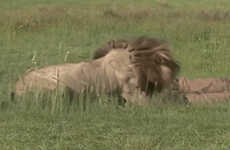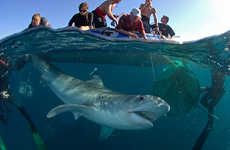
The WWF's 'Horrifying' Campaign is To-the-Point
Omar Yusuf — October 6, 2011 — Social Good
References: adsoftheworld & treehugger
The message behind the World Wildlife Foundation 'Horrifying' campaign is simple and concise: although sharks may seem scary, a world devoid of them would genuinely be frightening.
Those unconvinced by the urges of environmentalists to hit the brakes on the global industrial complex often take the Machiavellian opinion that natural selection has left people on top -- might makes right. What these individuals don't grasp, however, is the effect of trophic levels on the entire biosphere. Sharks (and all big game predators, for that matter) provide a pivotal failsafe measure on the population and habits of their prey. If vultures, for instance, disappeared due to habitat destruction, the local environment would be thrown into complete disarray. What the WWF's Horrifying campaign does is educate the audience on the importance of non-human, non-domesticated animals. You may not interact with sharks, but they're focal to the continued balance of life under the oceans!
Those unconvinced by the urges of environmentalists to hit the brakes on the global industrial complex often take the Machiavellian opinion that natural selection has left people on top -- might makes right. What these individuals don't grasp, however, is the effect of trophic levels on the entire biosphere. Sharks (and all big game predators, for that matter) provide a pivotal failsafe measure on the population and habits of their prey. If vultures, for instance, disappeared due to habitat destruction, the local environment would be thrown into complete disarray. What the WWF's Horrifying campaign does is educate the audience on the importance of non-human, non-domesticated animals. You may not interact with sharks, but they're focal to the continued balance of life under the oceans!
Trend Themes
1. Environmental Conservation Awareness - Create campaigns that educate the public on the importance of non-human, non-domesticated animals.
2. Trophic Level Impact - Highlight the crucial role of big game predators in maintaining population and habitat balance.
3. Machiavellian Perspective Challenge - Challenge the belief that humans are at the top of the natural selection chain and emphasize the interconnectedness of species.
Industry Implications
1. Environmental Nonprofits - Opportunity to develop impactful conservation campaigns that raise awareness and generate support.
2. Wildlife Tourism - Incorporate educational programs and experiences that emphasize the importance of big game predators to the ecosystem.
3. Ecological Research - Focus research efforts on understanding and communicating the trophic level impact on the entire biosphere.
5.1
Score
Popularity
Activity
Freshness























